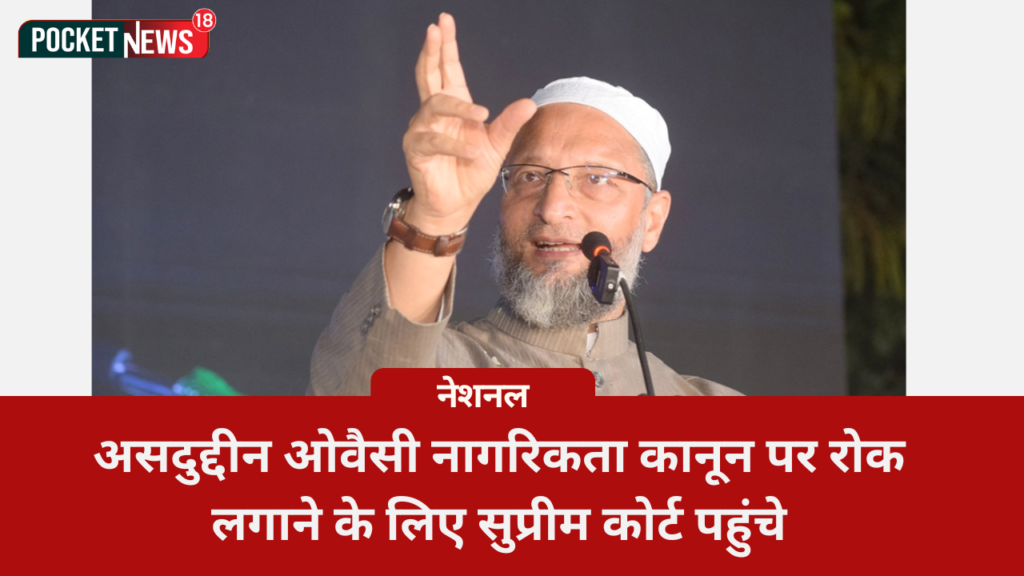
केंद्रीय गृह मंत्रालय ने 11 मार्च को नागरिकता संशोधन अधिनियम (सीएए) के कार्यान्वयन के लिए नियमों को अधिसूचित किया।
नई दिल्ली:
ऑल इंडिया मजलिस-ए-इत्तेहादुल मुस्लिमीन (एआईएमआईएम) प्रमुख असदुद्दीन ओवैसी ने विवादास्पद नागरिकता संशोधन अधिनियम (सीएए) के कार्यान्वयन पर रोक लगाने की मांग करते हुए सुप्रीम कोर्ट का दरवाजा खटखटाया है।
अपनी याचिका में, ओवैसी ने केंद्र सरकार को निर्देश देने की मांग की कि वह लंबित अवधि के दौरान नागरिकता अधिनियम, 1955 (क्योंकि यह नागरिकता (संशोधन) अधिनियम, 2019 द्वारा संशोधित है) की धारा 6 बी के तहत नागरिकता का दर्जा देने की मांग करने वाले आवेदनों पर विचार या कार्रवाई न करे। कार्यवाही का.
असदुद्दीन ओवैसी के वकील, एडवोकेट निज़ाम पाशा ने एएनआई को बताया कि उन्होंने 2019 में एक आवेदन दायर किया था जब अधिनियम संसद में पारित हुआ था।\
“हमने 2019 में एक याचिका दायर की थी जब सीएए पारित किया गया था, जिसमें अनुच्छेद 21 और 25 में इसकी संवैधानिक वैधता को चुनौती दी गई थी। उस समय, अंतरिम रोक के लिए आवेदन पर बहस नहीं की गई थी क्योंकि केंद्र सरकार के वकीलों ने कहा था कि उनका ऐसा कोई इरादा नहीं था। अधिनियम को तुरंत क्रियान्वित किया जा रहा है। अब, चार साल बाद, सरकार ने अधिनियम को क्रियान्वित करने के लिए नियमों को अधिसूचित किया है और इसलिए हम अधिनियम और नियमों के कार्यान्वयन पर रोक लगाने के लिए एक अंतरिम आवेदन दायर कर रहे हैं, ”उन्होंने कहा।
केंद्रीय गृह मंत्रालय ने 11 मार्च को नागरिकता संशोधन अधिनियम (सीएए) के कार्यान्वयन के लिए नियमों को अधिसूचित किया।
असदुद्दीन ओवैसी ने उन 1.5 लाख मुसलमानों के भाग्य पर सवाल उठाया, जिन्हें राज्य में नागरिकता संशोधन अधिनियम (सीएए) लागू होने के बाद कथित तौर पर असम में राष्ट्रीय नागरिक रजिस्टर (एनआरसी) सूची से बाहर कर दिया गया था।
केंद्र ने पूरे देश में सीएए लागू करने के लिए नियम प्रकाशित किए, ओवैसी ने कहा, “असम के सीएम हिमंत बिस्वा सरमा ने कहा कि राज्य में आयोजित एनआरसी में सूचीबद्ध नहीं किए गए 12 लाख हिंदुओं को सीएए के तहत भारतीय नागरिकता दी जाएगी। लेकिन 1.5 के बारे में क्या?” लाख मुसलमान?”
केंद्र द्वारा पेश किए गए और 2019 में संसद द्वारा पारित सीएए नियमों का उद्देश्य बांग्लादेश, पाकिस्तान और अफगानिस्तान से आए हिंदू, सिख, जैन, बौद्ध, पारसी और ईसाइयों सहित सताए गए गैर-मुस्लिम प्रवासियों को भारतीय नागरिकता प्रदान करना है। और 31 दिसंबर 2014 से पहले भारत आ गए।
Asaduddin Owaisi Approaches Supreme Court Seeking Stay On Citizenship Law
The Union Home Ministry notified the rules for implementation of the Citizenship Amendment Act (CAA) on March 11.
New Delhi:
All India Majlis-e-Ittehadul Muslimeen (AIMIM) chief Asaduddin Owaisi has approached the Supreme Court seeking a stay on the implementation of the contentious Citizenship Amendment Act (CAA).
In his petition, Owaisi sought directions to the central government not to entertain or process the applications seeking grant of citizenship status under Section 6B of the Citizenship Act, 1955 (as it stands amended by the Citizenship (Amendment) Act, 2019) during the pendency of the proceedings.
Advocate Nizam Pasha, Asaduddin Owaisi’s attorney, told ANI that they filed an application in 2019 when the act was passed in Parliament.\
“We had filed a petition in 2019 when CAA was passed, challenging its constitutional validity in Articles 21 and 25. At that time, the application for interim stay was not argued because the lawyers for the central government had said that they had no intention of immediately operationalising the act. Now, after four years, the government has notified rules to operationalise the act and therefore we are filing an interim application asking for a stay of implementation of the act and the rules,” he said.
The Union Home Ministry notified the rules for implementation of the Citizenship Amendment Act (CAA) on March 11.
Asaduddin Owaisi questioned the fate of 1.5 lakh Muslims, who were allegedly left out of the National Register of Citizens (NRC) list in Assam after the Citizenship Amendment Act (CAA) was implemented in the state.
Centre published the rules for implementing CAA across the country, Owaisi said, “Assam CM Himanta Biswa Sarma said the 12 lakh Hindus not listed in the NRC that was conducted in the state will be given Indian citizenship under the CAA. But what about the 1.5 lakh Muslims?”
The CAA rules, introduced by the Centre and passed by the Parliament in 2019, aim to confer Indian citizenship to persecuted non-Muslim migrants, including Hindus, Sikhs, Jains, Buddhists, Parsis, and Christians who migrated from Bangladesh, Pakistan, and Afghanistan and arrived in India before December 31, 2014.